Early career planning is essential so students may identify their interests in order to develop relevant skills for future jobs. The University of Macau (UM) emphasises holistic student development and has introduced a Global Career Development Facilitator certificate course to enable faculty and staff to provide systematic counselling services. This allows students to seize opportunities in a highly competitive job market.
Providing systematic counselling services for students
The courtyard of UM’s Henry Fok Pearl Jubilee College is a place where students from different disciplines and years of study discuss their interests and future career paths. Dr Jiang Yi, associate master of HFPJC, interacts with students and listens to their ideas on a regular basis. As the semester is about to come to an end, Dr Jiang asks students: ‘What are your plans for summer? Will you travel a bit or join an internship during the break?’ Through these questions, she hopes to encourage students to think about how they can make the most of the holiday to plan for their future.
As a first-year student joins a residential college (RC), he or she becomes part of a ‘family’ that includes the college master, fellows, and other students. In addition to the abundant academic resources available from their faculties, students also explore their interests through the various activities at their RCs, which is one of the educational characteristics of UM. With over 30 years of experience in education, Mok Kai Meng, vice rector (student affairs) and master of HFPJC, attaches great importance to career guidance for young adults. He says that the university is committed to providing an inspiring and experiential environment for students and career planning is a crucial component of whole-person education. ‘College masters, fellows, staff responsible for student affairs, and even sports coaches are all inspirational figures that can provide guidance and support for students in planning their career paths,’ says Prof Mok.
To enhance their ability to assist students in exploring career options, 40 staff members working in student affairs joined a dual certificate course in December 2022 to receive Global Career Development Facilitator training and Beisen Career Facilitator training. The course was co-organised by UM and the Macao New Chinese Youth Association. ‘We have been working hard to enhance career development services. The dual certificate course is specifically designed for staff who frequently interact with students and will enable them to better guide students in planning their career paths, through a standardised counselling process and using professional tools,’ Prof Mok adds.
Advising students on career decisions
When students encounter difficulties in academics or personal growth, they can speak freely with RC staff and enjoy counselling services in designated spaces. Dr Jiang has served and lived with students in an RC for nearly a decade, and has observed the tremendous benefits career planning provides for students. In order to make career counselling services more systematic, she enrolled in the dual certificate course. During the interview, she demonstrated her counselling methods and assessment tools, such as Holland Occupational Themes, career skills cards, and values cards, which can help students learn more about their personality, interests, and strengths, and identify the career areas or development paths that suit them. ‘The training reminded us of the quality requirements and role of career planners, whose job is not to provide direct answers for students, but to guide them in exploring options and making the best use of university resources to fulfil their dreams,’ says Dr Jiang.
In addition to learning their way around the campus, first-year students also have much to learn about career development. For this reason, they are required to take a compulsory course in experiential learning jointly offered by the faculties and RCs. The course helps students develop soft skills beyond their professional fields through a systematic study plan. Prof Mok, who often encourages students to learn by doing, explains that the RCs adopt a curriculum-based planning approach to inspire new students to equip themselves during their time in university. This approach teaches them how to break down their ambitious goals into small, achievable steps, and integrate them into their study life. ‘Apart from laying a solid academic foundation, students will learn how to set objectives in university for themselves and develop their skills through putting knowledge into practice, so that they can make wise career choices,’ he says.
Various measures to support students in career development
Having a good understanding of market demand and industry trends is essential to finding the right career direction. UM alumni often return to their RCs to share industry experiences and provide students with valuable insights and knowledge. For instance, alumni Lin Bin and Alex Fong, both engineers in Macao, returned to their RC in April 2023 together with two friends from the industry and discussed the future of the electromechanical engineering industry. As the four engineers work in different positions and belong to different companies, audience members gained a better understanding of the career options available in this field. Dr Jiang says that students usually have limited knowledge about potential career paths as well as available positions in the industry chain. ‘Due to the lack of information about the industry, students may struggle with career planning. The advice of alumni can therefore help students choose a right path,’ she says.
UM holds a Career and Internship Fair every year in March. Over 110 companies and organisations from different industries participated in the fair in 2023, offering more than 3,000 job vacancies. The fair also featured a series of career guidance seminars to support graduating students in their job search. Dr Elvo Sou, head of the Student Counselling Section of the UM Student Affairs Office, says that second-year and third-year students can engage with companies at the fair to learn more about Macao’s job market. ‘By joining on-site consultations, students can evaluate whether their skills and experience align with job requirements, which is a crucial aspect of career planning,’ he says.
According to Dr Sou, UM’s Career Development Centre offers a range of workshops, sharing sessions, and counselling services to enhance students’ job competitiveness and entrepreneurial skills, so that they will be ready to work, start their own businesses, or pursue further education upon graduation. For instance, students interested in entrepreneurship can participate in the Student Shop Competition to compete for the right to manage a shop on campus, which can help them accumulate experience. ‘They can also join entrepreneurship competitions organised by the Centre for Innovation and Entrepreneurship to gain knowledge of market research, business planning, and financial management. As a national co-working space, the centre provides an advantageous environment for young entrepreneurs to secure resources and develop their projects. In summary, UM has implemented different measures to help students achieve their career goals,’ he adds.
Instilling in students the importance of career planning
In an era in which many jobs require interdisciplinary skills, how can students enhance their job competitiveness during university? With over a decade of experience in student career counselling, Dr Sou has closely followed trends in human resource demand. According to him, as AI now can handle jobs such as illustration, illustrators must upgrade their skills or change their professional direction, and for this reason, the most sought-after candidates in today’s job market are those with ‘T-shaped skills’.
Dr Sou says that the vertical stroke in ‘T’ means professional skills and specialised knowledge, while the horizontal stroke represents transferable skills for purposes such as interpersonal communication, technology application, problem-solving, and innovation. Candidates with ‘T-shaped skills’ are highly adaptable to changing work environments as their knowledge and skills are desired across different sectors. For example, Dr Sou says that he met a communication student who developed a strong interest in early childhood education. For this reason, after graduation, she returned to UM to pursue a postgraduate certificate in education, and was later hired as a kindergarten teacher. Her combined knowledge of communication and video production is one of the reasons she stood out from the crowd. ‘Work in today’s kindergartens involves devising plans for student recruitment, or even managing social media accounts. Instead of hiring a photographer to do a single task, it seems more reasonable to recruit a teacher with video production skills,’ he says.
As AI becomes popular, tasks that once took half a day are now completed in half an hour. This technological shift also means that some job positions may become obsolete in the future. For example, because AI now handles jobs such as illustration, illustrators must upgrade their skills or change their professional direction. According to Dr Sou, students must adopt a lifelong learning attitude and be prepared to adapt to change, which is a crucial element in career planning. He also encourages students to expand their social networks and engage in community services. ‘Don’t focus solely on short-term gains. Serve others to make a positive impact on society and fulfil your purpose. This is a value that we strive to instill in students through career planning,’ he adds.
Broadening the career path of student-athletes
Grace Chau, director of the Office of Sports Affairs (OSA), gave a presentation to a group of accomplished third-year high school students at the UM Sports Complex. These students have represented Macao in international or regional competitions, and many have achieved impressive results. During the presentation, Chau introduced them to the UM Principals’ Recommended Admission Scheme for Outstanding Student-Athletes and stressed the importance of career planning for athletes. ‘Student-athletes, more than any other students, need to make plan for their future careers,’ says Chau. To support high school students in choosing their majors, OSA has organised seminars at St John de Brito School, Yuet Wah College, and Salesian Institute on how to identify one’s interests and strengths. ‘Student-athletes contribute to the sports development of Macao and we aim to assist them by broadening their future paths,’ she adds.
Student-athletes, especially those who are members of the Macao team, face the challenge of balancing sports training and competition with academic studies. As a result, they may not have sufficient time to understand the job market and its demand for professionals, nor to plan their careers. To address this issue, OSA provides relevant services to reduce student-athletes’ pressure to balance employment, academic performance, and sports performance. The office has launched a career and internship programme in collaboration with different companies to offer career talks, on-site job interviews, corporate visits, and internship programmes tailored to student-athletes to help them find a suitable career. ‘A special job fair was held in February at the Centre for Innovation and Entrepreneurship. The event attracted more than 70 graduating student-athletes, with a fourth-year student from the Korfball Team and the Department of Mathematics successfully landing a job,’ says Chau.
‘Apart from supporting student-athletes in career planning, we also present their strengths to employers,’ she adds, further explaining that UM athletes possess different professional knowledge which adds to their exceptional concentration, perseverance, and resilience gained from years of intensive training and competition. For this reason, they are outstanding job candidates who can overcome adversity and maintain positivity over extended periods.
‘We are actively collaborating with companies such as Sands China, SJM Resorts, MGM, China Construction Engineering, and Nam Kwong Group. These companies provide on-site career matching for student-athletes, as well as flexible summer internships that allow them to participate in sports competitions, including those at national level, over summer,’ says Chau. ‘These initiatives not only enrich the students’ personal experience and enhance their future employment prospects, but also contribute to the long-term growth of Macao’s sports industry.’
Broadening the world view through trial and error
Many UM alumni were motivated during their time at UM by the experiential learning courses in their RCs. Thanks to these courses, they became more aware of their abilities and were inspired to challenge themselves and develop their career potential. Prof Mok believes that, in the face of challenges such as changes in the global landscape, regional integration, and the emergence of new industries, it is particularly important for job seekers to be equipped with the necessary skills. He also sees the Guangdong-Hong Kong-Macao Greater Bay Area and the Guangdong-Macao In-depth Cooperation Zone in Hengqin as new development opportunities for young adults. ‘We hope to instill in students the importance of career planning and encourage them to make plans for individual learning and future development as early as possible, so that they will be prepared to integrate into national development upon graduation,’ he says.
Making progress sometimes requires students to step out of their comfort zone to explore new possibilities. To facilitate this, the RCs organise study trips to the Greater Bay Area and mainland cities for students to learn about current developments in mainland China. Prof Mok encourages students to let go of preconceptions and see things from a fresh perspective. ‘When moving to a new place, one will inevitably encounter cultural differences and challenging new concepts. However, it is only through this that one can expand his or her worldview and adopt new perspectives,’ says Prof Mok. ‘By breaking free from established patterns, students will be better equipped to adapt to new cultures and work effectively with people from different backgrounds.’
Text: Kelvin U
Materials management: UM Reporter Zhang Jiahe
Photo: Editorial Board, with some provided by the interviewees
English Translation: Anthony Sou
Source: My UM ISSUE 124
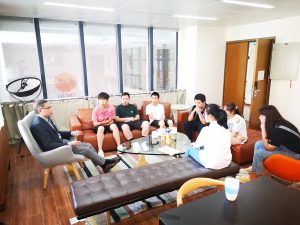
Prof Mok Kai Meng shares his experience with students
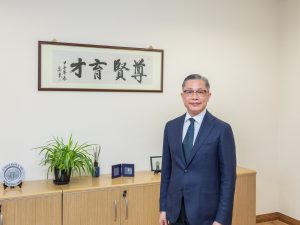
Prof Mok Kai Meng

UM provides Global Career Development Facilitator training for faculty and staff
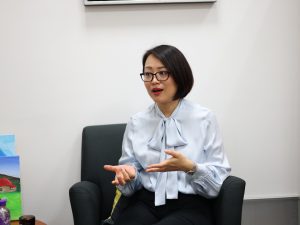
Dr Jiang Yi
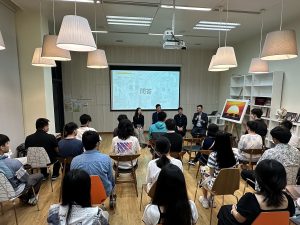
UM alumni Lin Bin and Alex Fong share the employment prospect in Macao’s electromechanical engineering industry
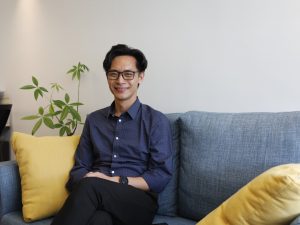
Dr Elvo Sou
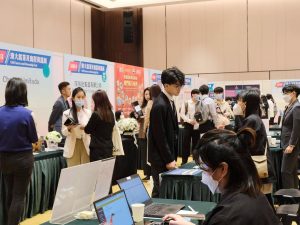
UM holds the Career and Internship Fair to help students learn more about Macao’s job market
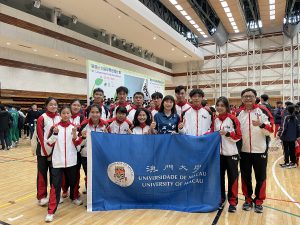
Grace Chau (4th from right, front row) and UM student-athletes at a competition
